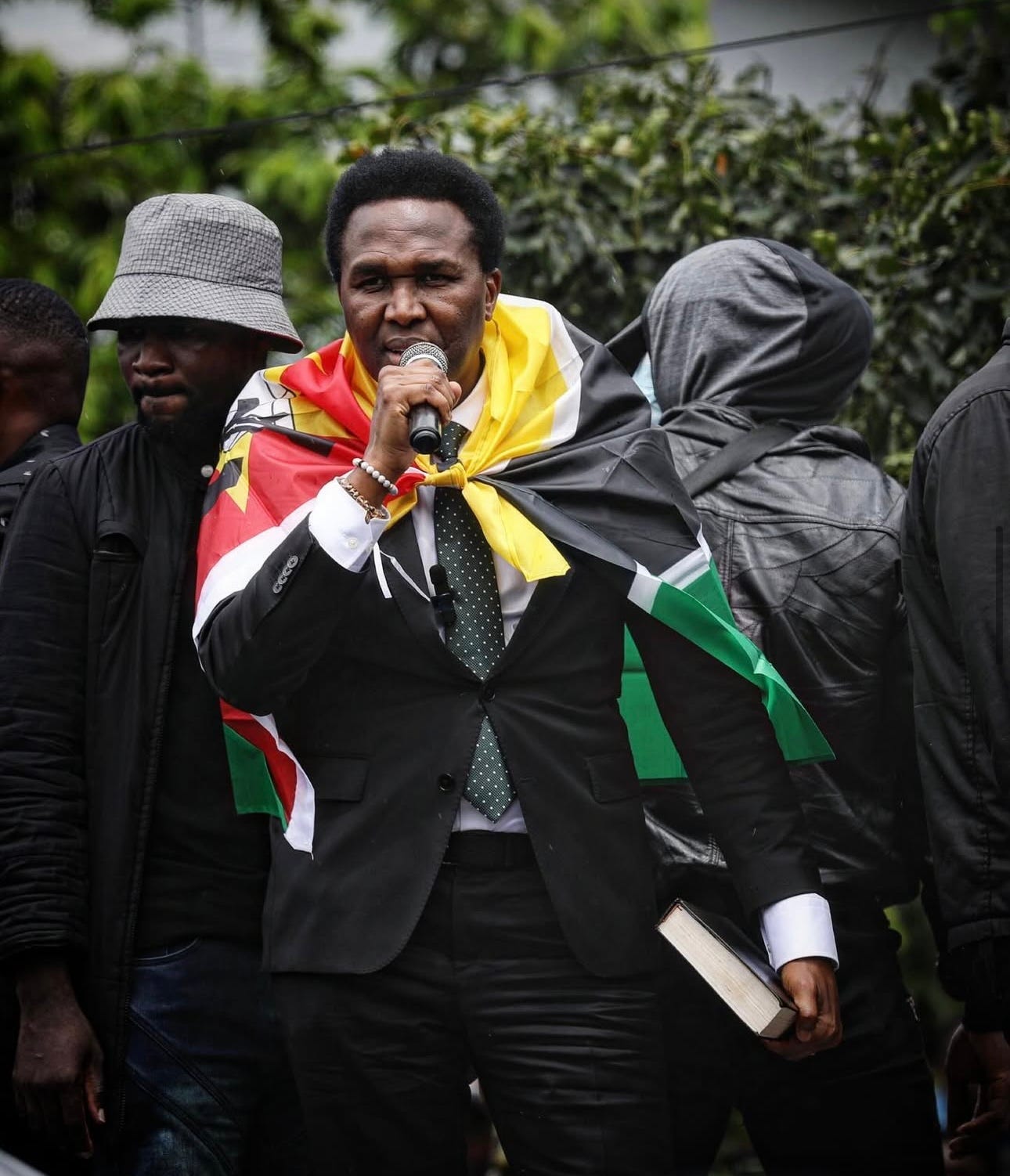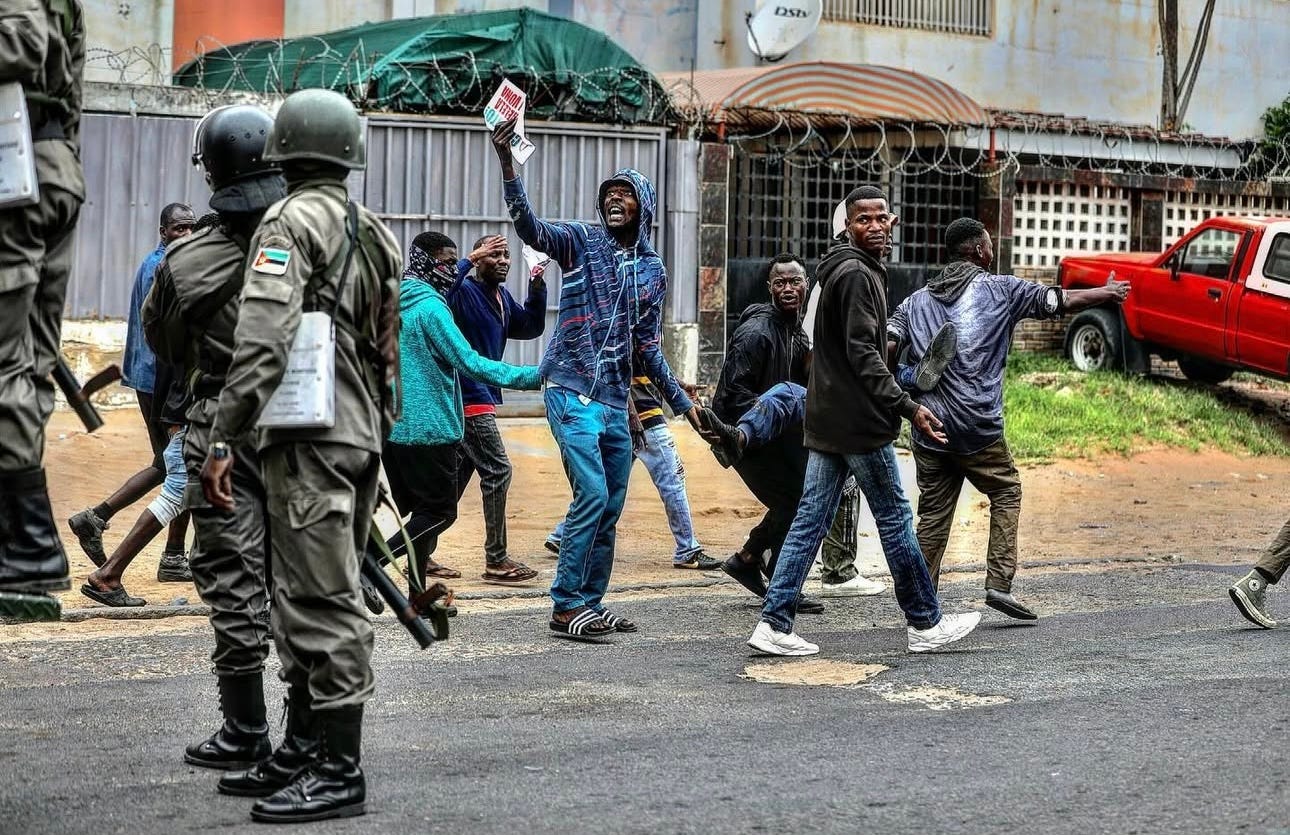Debrief Africa
How Mozambique’s Democracy Became a Battleground
Specialist Risk Consultant for Africa, Marisa Lourenço, and Mozambican NGO, Justice Frontil Equitas break down the post-elections violence in Mozambique, March 2025
Why should Mozambique be on your radar?
Five months after the Mozambican General Elections, tensions persist following former presidential candidate Venâncio Mondlane’s challenge to the results, which crowned Frelimo’s Daniel Chapo as president. The situation took a dramatic turn on March 12, when the president’s main rival was questioned for 10 hours about his alleged involvement in the post-election violence that has plagued the country since October. Mondlane retaliated by laying a complaint against President Chapo for a speech made in February, in which Chapo threatened to “spill the blood” of protesters. Alarmingly, the situation in Mozambique shows signs of escalating, rather than calming down. Just like you and I, the people of Mozambique want peace, stability, and a thriving democracy where their voices are heard through the voting process. Unfortunately, Amnesty International says that “the crackdown on protests in Mozambique following last year’s election has been appalling. It is the bloodiest election cycle in Mozambique’s post-civil war history.”
Mozambicans stand up to a repressive government, October 2024. Source: Luísa Nhantumbo
Plataforma Decide, a Mozambican NGO that monitors electoral processes, says that the protests that began in October 2024, after the general elections, have been violently suppressed by the state, resulting in almost 360 deaths, including two dozen children, with 3,500 injured and many jailed. The anger of civilians against the corruption of the Frelimo-led government is further exacerbated by a cost-of-living crisis, complex socio-political and environmental crises. According to a Human Rights Watch report, nearly 850,000 Mozambicans have been displaced due to terror attacks in Cabo Delgado, severe drought cycles, and frequent cyclones. Marisa Lourenço, a Specialist Risk Consultant for Africa, explains, “Local businesses have struggled, primarily with higher food prices (as protests disrupt trade) that they cannot pass onto struggling consumers. The protests have also been underpinned by the high cost of living, so higher food prices could drive other demonstrations or low sales.”
Democracy Index, 2006 – 2024. Source: Economist Intelligence Unit/OurWorldinData.org/democracy
So, what happened?
Mozambique held its national elections on October 9, 2024, which were widely deemed irregular and fraudulent by national and international observers. Due to a lack of transparency, the results were contested. The opposition’s main presidential candidate Mondlane, ran as an independent, and was initially backed by the Optimist Party for the Development of Mozambique (Podemos), called for a peaceful march on October 21 to challenge the results. However, the Police of the Republic of Mozambique responded with extreme violence, using tear gas and live bullets. On October 29, two high-ranking opposition officials, lawyer Elvino Dias and party official Paulo Guambe, were killed. Their deaths became a catalyst for widespread violence, as citizens erupted in anger over the fraudulent election results. In an interview with me, local NGO Justice Frontil Equitas, says “since the elections, ordinary people have lost their lives simply for attending protests and expressing their grievances, and instead of being heard, they have been met with lethal force by the police.”
The official results declared Daniel Chapo of Frelimo the winner with over 70% of the votes, while Mondlane of Podemos received only 20%. Frelimo, a former colonial liberation party, has ruled Mozambique since the country gained independence from Portugal in 1975. A separate vote count conducted by Podemos determined that their presidential candidate, Venâncio Mondlane, was the lawful winner. The matter was brought before Mozambique’s highest court, which ultimately confirmed Frelimo as the winner but adjusted the votes to 65% for Chapo and 24% for Mondlane. According to Dr Egídio Chaimite, a Senior Researcher at IESE in Mozambique for IPS, “Although more serious now, Mozambique’s current deadlock mirrors the tensions that followed the 2009 elections. As then, there is reluctance to engage in meaningful dialogue. Sadly, that earlier impasse eventually gave way to armed confrontations between the Mozambican National Resistance (Renamo), the largest opposition party at the time, and the Frelimo government.”
Venâncio Mondlane talking to his supporters, 9 January 2025. Source: Luísa Nhantumbo
The post-election violence culminated on March 5, 2025, when the Mozambican government held a ceremony for the ‘Political Commitment for National and Inclusive Dialogue’ in Maputo City. During the event, contested President Daniel Chapo signed an agreement with various political parties to address the post-election violence. The agreement was signed by parliamentary representatives, Frelimo, Podemos, Renamo and the Democratic Movement of Mozambique (MDM). Some parties without seats in parliament, also signed the agreement; New Democracy (ND), National Reconciliation Party (Parena), Social Renewal Party (Pareso), Humanitarian Party of Mozambique (Pahumo) and the Democratic Revolution (RD). However, the agreement notably excluded Mondlane.
In response, Mondlane, who is referred to as the ‘People’s President’, called for a peaceful march. Instead of a peaceful march, Mozambicans fighting for their democracy were met by police with bloody violence. On the day of the agreement, 16 people attending the march were injured, with two children shot, when police fired live ammunition, rubber bullets and tear gas at Mondlane’s convoy. Local activists have called it an assassination attempt by the Frelimo government. Mozambican NGO, Justice Frontline Equitas, says that one of the children who was shot in the mouth, is currently still hospitalized. This state violence is affecting the general population in severe ways, which begs the question whether the new president will put his people before his party. On March 9, two Mondlane supporters were also viciously killed while in a car. This continued brutal suppression of the main opposition is a threat to the Mozambican people’s attempt at a democratic state. Lourenço explains that since the general elections, “Hundreds of lives have been lost, and civil society is operating in an increasingly dangerous space. The danger is not over yet. President Daniel Chapo is showing that his government is prepared to use more violence against protesters, with civic freedoms narrowing every day in the country.”
While Chapo’s government heavily suppresses the opposition, media, and civilians, Mondlane has sworn to keep fighting until the true election results are proclaimed, and he is declared as the president. According to Chaimite, “In a defiant bid to undermine Chapo’s authority, Mondlane has embraced a shadow governance model. Issuing what he calls ‘presidential decrees’, he has called for civil disobedience, including boycotts of toll fees and demands for price reductions on essential goods like water, energy and cement. His populist measures have struck a chord with many supporters, but their enforcement often spirals into protests and, at times, violence.” These two opposing politicians need to come together, if there is to be any hope for Mozambique’s future.
Mozambican protestors carry injured at a protest, November 2024. Source: Luísa Nhantumbo
Who are the main characters that you need to know about in Mozambique?
With such a complex situation unfolding, it is hard to keep track of the central players. Here are the main characters shaping Mozambique’s current affairs:
Daniel Chapo and Frelimo
Who? Contested President of Mozambique, and of the Frelimo party
What? Chapo succeeded former President Filipe Nyusi of the Frelimo party in January 2025. According to Lourenço, “Mozambique has never been a democracy, but under the Nyusi administration it became strikingly draconian and a much less free space for the media and civil society. That is likely to remain the case going forward.”
Venâncio Mondlane
Who? Main opposition politician, also goes by the People’s President
What? Formerly supported by the Podemos party, Mondlane has become Frelimo’s main opposition. He has challenged Frelimo’s dominance in a way that other political parties have struggled to. Mondlane signifies the growing discontentment of Mozambican citizens with the decades-long ruling Frelimo party and their corruption.
International Companies
Who? Multinational corporations, like TotalEnergies, mining Mozambique’s natural resources
What? These corporations are extracting Mozambique’s natural resources, while failing to develop the areas in which they are operating. This is leading to further discontent among civilians. Lourenço highlights, “Mozambique has turned a corner in which foreign private businesses can no longer promise community development and not follow through with it. The protests over the last few months have encompassed much more than frustration at Frelimo and with the October 2024 general elections. We have seen communities ask where the promised roads are, and we have seen businesses hastily trying to appease their demands. People realise that they have the power, and now they are not afraid to push.”
Regional Actors
SADC (Southern African Development Community): Has deployed soldiers to help fight against terror groups in Cabo Delgado.
A Mozambican protestor surrenders to the army, November 2024. Source: Luísa Nhantumbo
What’s the expert take on Mozambique?
Some experts on Mozambique find that corruption and poor governance are the main causes keeping Mozambique from becoming a thriving democracy. Lourenço emphasises,
“Mozambique is one of the poorest countries in the world, and its population has been getting poorer. This is the result of governance failure, and it is an issue that cannot be fixed easily. This means that socio-economic protests will remain a feature of Mozambican society for years to come. If I had to sum it up, I would say that Mozambique’s biggest problems are ill-suited macroeconomic policies and extensive corruption.”
On the other hand, the long history of Frelimo ruling Mozambique at the country’s expense, and suppressing opposition to its rule, will continue to keep the country in crisis, unless the ruling party brings all actors to the table. Chaimite says, “To prevent history from repeating itself, leaders need to do more than make symbolic gestures; the situation calls for authentic, inclusive engagement that amplifies the voices of all - including opposition leaders and civil society. Only by replacing entrenched divisions with sincere dialogue can the country break free from its cycle of conflict and work toward a stable, democratic future. At the end of the day, while political parties fight to the death, innocent civilians are the ones suffering the brunt of political violence.
What’s the takeaway from this?
A country pushed to their limit, Mozambicans, tired and enraged, refuse to accept a government overcome with corruption any longer. Despite the deadly state repression, Mozambicans have vowed to continue protesting, until they see change. They are now looking to former presidential candidate, Mondlane, as a symbol of resistance and hope. For ordinary Mozambicans, they see someone who will deliver them from their country’s challenges and bring a brighter tomorrow. Local NGO, Justice Frontil Equitas ends our interview by saying, “The people of Mozambique simply want to live normal lives, free from oppression by the military and police force.”









